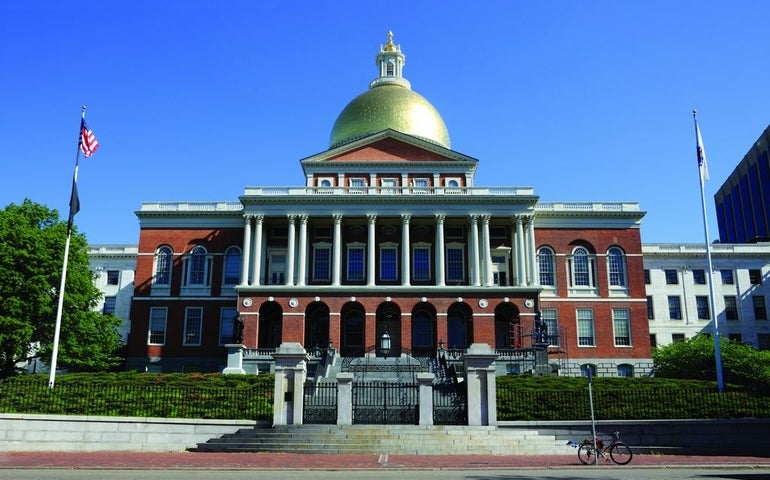Lawmakers are slowly gearing up for a formal review of the complex, contended initiative petitions on track to go before voters this fall, and a special panel could soon put hearing dates on the calendar to open up debate.
But there’s a twist: half of the issues they’re set to review are live wires subject to legal battles that could wind up blocking them from the ballot altogether. So how will that change the Legislature’s approach?
For now, the answer appears to be: very little.
Top House and Senate Democrats signaled they will not deploy a different strategy as they review ballot questions covering half a dozen topics, including three facing eligibility challenges before the Supreme Judicial Court.
Rep. Alice Peisch, a Wellesley Democrat co-chairing a special committee tasked with vetting the field of initiative petitions, said the panel will “review the proposed ballot questions on the merits as required by the Massachusetts Constitution and will leave to the courts to decide whether the petitioners met the legal requirements for such questions.”
Her counterpart, Sen. Cindy Friedman, agreed.
“Senator Friedman doesn’t anticipate any impact of the open court cases on the work of the special committee,” a spokesperson for the Arlington Democrat, who is the top senator on the panel, told the News Service. “In her view, the role of the special committee is to consider all of the proposals and provide a report to the General Court on the initiative petitions as they are currently written.”
Friedman’s spokesperson, Stephen Acosta, said the committee would “change the approach” if the court intervened to strike down any of the ballot questions before lawmakers begin their hearings.
That seems unlikely, though. In two of the eligibility cases, a single justice reported the matter to the full court and projected that oral arguments are likely to take place in May — so if the SJC waited until after arguments to rule, its decisions would not come until the May 1 deadline for the Legislature to act has lapsed.
“Given that we are unsure of the timeline of those decisions, the committee will proceed with the assumption that these proposals will stand as written to ensure that the Legislature will have any information it needs in a timely manner,” Acosta said.
Legal complaints contesting a measure’s eligibility to appear on the ballot are fairly common. This cycle, opponents have challenged three proposals: one allowing Uber and Lyft drivers to unionize, another eliminating the separate tipped minimum wage, and multiple versions of a measure defining app-based drivers as independent contractors while extending them some new benefits.
All three cases hinge more on whether the questions are properly drafted to go before voters than on the policy specifics. The state Constitution requires initiative petitions to feature only related or mutually dependent issues, and plaintiffs in each of the three cases argue the measures are too wide in scope.
The so-called relatedness test has been a pitfall for ballot questions in the past, including two years ago, when the SJC tossed an earlier version of the drivers-as-contractors measure.
Each cycle, the Legislature gets a chance to review all of the proposals that campaigners want to be decided at the ballot box, some of which involve controversial or thorny policies that lawmakers have hesitated to tackle.
The House and Senate have until the first Wednesday in May to decide whether to approve the measures, propose substitute versions or take no action.
This time around, top Democrats took the somewhat unusual step of convening a special committee — above and beyond the long list of legislative panels with subject-matter expertise — to lead the work on ballot questions. They cited the volume of questions and their intertwined natures, arguing that a special committee will be “especially equipped to tackle the unique challenges presented.”
Three weeks after legislative leaders created the panel, it’s still not clear when it will formally begin its work. Acosta said the committee is finalizing its schedule “over the next few days” and that more information about hearings should be available soon.
Lawmakers might feel inclined to try and avert some of the questions heading to the ballot given their complexity, especially on the gig economy front.
If both the industry-backed and labor-backed questions about app-based drivers make it onto the ballot, for example, voters will simultaneously be asked to declare that drivers are independent contractors instead of employees and also that they have the right to form a union — all colored by the potential fallout from a trial scheduled for the spring over whether Uber and Lyft are violating existing state law by treating their drivers like contractors.
The Legislature is also the subject of one of the proposed ballot questions — the push led by Auditor Diana DiZoglio to secure explicit authority for her office to audit the House and Senate.
Timeline pressure has been on the minds of the state’s top justices before, too. In a 2016 ballot question ruling, the SJC asked the attorney general’s office to ensure that official summaries of ballot questions are published by Feb. 1 — not the second Wednesday in May as is typically required — to avoid a “mad scramble” before official voter guides are sent to the printer in July.

